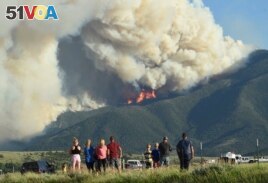17 June 2021
An early heat wave has been bringing high temperatures to the western United States.
Scientists are warning that the extreme heat and dry conditions might become normal. Many places in the American West have been reporting drought conditions for many years.
Park Williams is an associate professor in geography with the University of California, Los Angeles. He said, "Heat waves are getting worse in the West because the soil is so dry." Williams said soil in the western half of the country is the driest it has been since 1895.
For example, Phoenix, Arizona is having some of the highest temperatures this week. On Wednesday, it reached 46 degrees Celsius.
"We could have two, three, four, five of these heat waves before the end of the summer," Williams said.
An extreme heat warning is in effect until at least Sunday.

People cool off in the water at the confluence of the South Platte River and Cherry Creek in Denver, Wednesday June 16, 2021. A heat wave continues to hover over the western U.S., pushing the temperature to 99 degrees in Denver. (AP Photo/Brittany Peterso
Reports say in Palm Springs, California, the temperature reached 49 degrees Celsius on Tuesday. Weather experts say a high-pressure system spread over the west this week, causing unusually hot days.
Officials in California asked people to save electricity for a few hours on Thursday. They asked people to set their air-conditioning systems to 25.5 degrees Celsius or higher and turn off unnecessary lights and electronics. Officials said they do not expect power outages. But that could change if temperatures remain high in the coming days.
The San Francisco Bay area has also had higher than normal temperatures. Kathleen Craft works at a shelter in the city of Livermore, California. She said temperatures had reached 37 degrees Celsius but just one woman came to a special cooling center. Craft said she expects more people as temperatures rise.
Denver, Colorado, also saw a record high of 38 degrees Celsius on Tuesday. And western Colorado is under an extreme heat warning. The area is also experiencing extremely dry conditions.
John Salmen is a meteorologist with the National Weather Service. He said Las Vegas, Nevada, will likely remain at 45 degrees Celsius or hotter through Sunday. Temperatures could break the record high of 47 degrees Celsius set in June of 2017.
"This is pretty impressive. We're seeing all-time records fall," Salmen said.
In Montana, temperatures over 38 degrees Celsius have made it harder to fight forest fires. The fires have gotten much larger in size, destroying homes and forcing evacuations. High winds have spread the flames and forced the crash-landing of a firefighting helicopter. At least 14 new fires have been reported in Montana and Wyoming since Tuesday.

Residents watch as flames from the Robertson Draw fire burn above Red Lodge, Mont., Tuesday evening, June 15, 2021.(Larry Mayer/The Billings Gazette via AP)
Dry weather was also being felt in Idaho. Officials there are preparing for a difficult forest fire season.
Nick Nauslar is a meteorologist with the National Interagency Fire Center. He told state officials this week that 80 percent of Idaho is very dry. He said Idaho had its second-driest spring in the last 126 years.
I'm Dan Novak.
Anita Snow reported this story for The Associated Press. Dan Novak adapted it for VOA Learning English. Mario Ritter, Jr. was the editor.
_______________________________________________________________
Words in This Story
drought — n. a long period of time during which there is very little or no rain
outage — n. a period of time when there is no electricity in a building or area
meteorology — n. a science that deals with the atmosphere and with weather
evacuate — v. to remove (someone) from a dangerous place